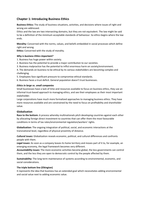Chapter 1: Introducing Business Ethics
Business Ethics: The study of business situations, activities, and decisions where issues of right and
wrong are addressed.
Ethics and the law are two intersecting domains, but they are not equivalent. The law might be said
to be a definition of the minimum acceptable standards of behaviour. So ethics begins where the law
ends.
Morality: Concerned with the norms, values, and beliefs embedded in social processes which define
right and wrong.
Ethics: Concerned with the study of morality.
Why is business Ethics important?
1. Business has huge power within society.
2. Business has the potential to provide a major contribution to our societies.
3. Business malpractice has the potential to inflict enormous harm on society/environment.
4. The demands on business to be ethical by its various stakeholders are becoming complex and
challenging.
5. Employees face significant pressure to compromise ethical standards.
6. Business faces a trust deficit. General population doesn’t trust businesses.
Ethics in large vs. small companies
Small businesses have a lack of time and resources available to focus on business ethics, they use an
informal trust-based approach to managing ethics, and see their employees as their most important
stakeholder.
Large corporations have much more formalized approaches to managing business ethics. They have
more resources available and are constrained by the need to focus on profitability and shareholder
value.
Globalization
Race to the bottom: A process whereby multinationals pitch developing countries against each other
by allocating foreign direct investment to countries that can offer them the most favourable
conditions in terms of tax rates/environmental regulation/workers’ rights.
Globalization: The ongoing integration of political, social, and economic interactions at the
transnational level, regardless of physical proximity of distance.
Cultural issues: Globalization reveals economic, political, and cultural differences and confronts
people with them.
Legal issues: As soon as a company leaves its home territory and moves part of it to, for example, an
emerging economy, the legal framework becomes very different.
Accountability issues: The more economic activities become global, the less governments can control
them, and the less they are open to democratic control by the people affected by them.
Sustainability: The long-term maintenance of systems according to environmental, economic, and
social considerations.
The triple bottom line (Elkington)
It represents the idea that business has an extended goal which necessitates adding environmental
and social value next to adding economic value.





